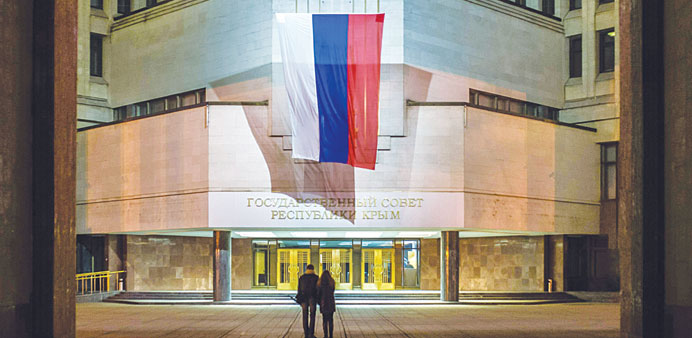|
Crimea’s economy is built on two main engines: tourism and agriculture. The current unrest and Russia’s annexation of Crimea could dissuade many would-be vacationers from both Ukraine and Western Europe. |
A serious drop in tourism numbers could translate into a serious hit for the peninsula’s economy, which is something Russia is already working hard to avoid.
The new government in Crimea had barely finished counting the votes from last Sunday’s referendum before it started to get investment offers from Russia.
One of the first projects on the table: Ruslan Baisarov, a billionaire businessman from Russia’s Chechnya region, says he’s prepared to invest $330mn in the construction of seaside resorts.
Following Baisarov’s announcement, the leader of Chechnya, Ramzan Kadirov, posted on Instagram: “I just spoke with the leader of Crimea on the telephone. I informed him of the intention of several of our businessmen, including Ruslan Baisarov, to aid Crimea by investing in important projects.”
It’s not clear which other Chechen businesspeople are preparing to invest in Crimea, but one source said that it might include the co-owner of Moscow Industrial Bank, Abubakar Arsamakov. Bank officials were not available for comment.
Baisarov explained to Kommersant that he plans to build a complex including 500 hotel rooms, a therapeutic spa with 200 rooms, a spa, a meeting hall, an amusement park with a water park, a marina for 400 yachts and a golf club. “Up to 40,000 people would be able to vacation at the complex every year, and it would create 1,300 jobs,” the businessman explained.
Right now, Crimea is incredibly popular with Russian vacationers - they made up 40% of the 6mn total visitors to Crimea.
Baisarov said the complex would be built in the southeast part of Crimea, though he didn’t say where the financing would come from. Someone with knowledge of the project indicated that financing would probably come from Russian state-owned banks, which are already helping to finance a large ski resort that Baisarov is building in Chechnya with the help of financing from state banks and the region’s status as a special economic zone for tourism and recreation.
It’s possible that this is exactly how Baisarov plans to finance the project in Crimea; even before the referendum took place, Crimean leader Sergei Aksenov had said that the region could get a Special Economic Zone status when it became part of Russia.
“Any region could be developed through a Special Economic Zone, including Crimea,” explained Vadim Tretyakov, head of the government agency that oversees special economic zones.
Crimean officials are expecting that establishing a special economic zone there would attract investment for projects in the tourism sphere, including many projects that have been planned since last year.
There is nothing new about Russian investors coming to Crimea. Many private investors and companies own and operate hotels there. Even Russian Sberbank owns a therapeutic spa in Crimea, which it purchased in 2010.
But if they build it, will they come? A tourism forum took place this week in Simferopol - called Crimea, First Spring - organised by the Russian ministry of culture.
Anna Manilova, a senior official at the ministry, explained that as part of the forum, Sergei Aksenov, Crimea’s pro-Russia prime minister, had signed a bilateral agreement with Moscow to encourage more Russians to vacation in the coastal region.
The Russian ministry of culture has proposed three ways to support the tourism industry in Crimea: working with travel agencies to sell more tour packages to Russians for trips to Crimea; increasing school trips to the region; and changing the destination of company-paid vacations at state companies. “Instead of sending them to Turkey or Egypt, they will go to Crimea,” explained Manilova.
To boost student travel to the region, Manilova said that officials would be meeting with tour operators and Crimean partners to make it possible for children to stay in four-star hotels during their stay in Crimea, and to negotiate discounts. Preliminary reports indicate that up to $5.5mn might be spent on student trips to Crimea, with regional governments and other sponsors picking up the tab for the air or train fare.
Lowering prices has also been suggested as a way to save Crimea’s tourism season. Owners of small hotels have promised to give visitors discounts this year. - Worldcrunch/Kommersant

